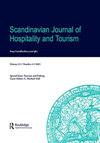Understanding the role of personal aspects in positive and negative meal experiences: psychological needs, values, and emotions
IF 3.1
4区 管理学
Q2 HOSPITALITY, LEISURE, SPORT & TOURISM
Scandinavian Journal of Hospitality and Tourism
Pub Date : 2021-10-15
DOI:10.1080/15022250.2021.1989717
引用次数: 0
Abstract
ABSTRACT The aim of this research was to study most positive and negative personal meal experiences in terms of experienced emotions, psychological needs, values, as well as the personal meal context. 64 participants wrote qualitative descriptions of their most positive and negative recent meal experiences and rated their personal experiences quantitatively using the PANAS method for experienced emotions, and questionnaires probing the salience of contextual aspects, psychological needs, and values. The results highlighted the psychological needs of relatedness and autonomy, both hedonistic and conservation values, and the emotions “interested” and “enthusiastic” as especially salient in most positive meal experiences. The qualitative results indicated that social aspects (“the meeting”) and the food and drink product were the most prominent aspects affecting both most positive and most negative meal experiences. The role of accompanying persons was especially salient in positive experiences and the role of meetings with service personnel in negative experiences. Issues related to the personal context (“the self”) were mentioned as factors affecting meal experiences in about 35% of most positive experiences and 40% of descriptions of most negative experiences. The results point out the benefits of including the personal context in studies of meal experiences along with traditionally studied aspects.理解个人因素在积极和消极用餐体验中的作用:心理需求、价值观和情绪
摘要本研究的目的是从体验情绪、心理需求、价值观以及个人用餐环境等方面研究大多数积极和消极的个人用餐体验。64名参与者对他们最近最积极和最消极的用餐经历进行了定性描述,并使用PANAS方法对他们的个人经历进行了定量评价,包括体验情绪,以及调查情境方面、心理需求和价值观的显著性的问卷。研究结果强调了相关和自主的心理需求,包括享乐和保护价值观,以及“感兴趣”和“热情”的情绪,在大多数积极的用餐体验中尤为突出。定性结果表明,社交方面(“会议”)和食品和饮料产品是影响最积极和最消极用餐体验的最突出方面。陪同人员的作用在积极经历中尤为突出,与服务人员会面在消极经历中的作用尤为突出。在约35%的大多数积极体验和40%的大多数消极体验描述中,与个人环境(“自我”)相关的问题被认为是影响用餐体验的因素。研究结果指出了将个人背景与传统研究的方面一起纳入用餐体验研究的好处。
本文章由计算机程序翻译,如有差异,请以英文原文为准。
求助全文
约1分钟内获得全文
求助全文
来源期刊
CiteScore
7.90
自引率
8.30%
发文量
14
期刊介绍:
Scandinavian Journal of Hospitality and Tourism is the leading Nordic journal for hospitality and tourism research. SJHT aims at initiating and stimulating high-impact and innovative research relevant for academics and practitioners within the hospitality and tourism industries. The journal takes an interdisciplinary approach including, but not limited to geography, psychology, sociology, history, anthropology, and economics. SJHT encourages research based on a variety of methods, including both qualitative and quantitative approaches. The journal covers all types of articles relevant to the Nordic region, as well as the North Atlantic, North Sea and Baltic regions. We also welcome reviews and conceptual articles with a broader geographical scope that clearly enhance the theoretical development of the hospitality and tourism field. In addition to research articles, we welcome research notes and book reviews. Published articles are the result of anonymous reviews by at least two referees chosen by the editors for their specialist knowledge.

 求助内容:
求助内容: 应助结果提醒方式:
应助结果提醒方式:


